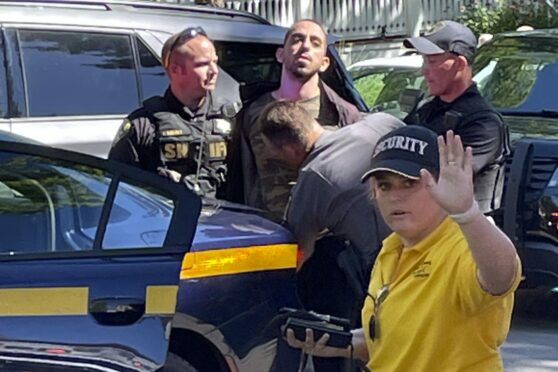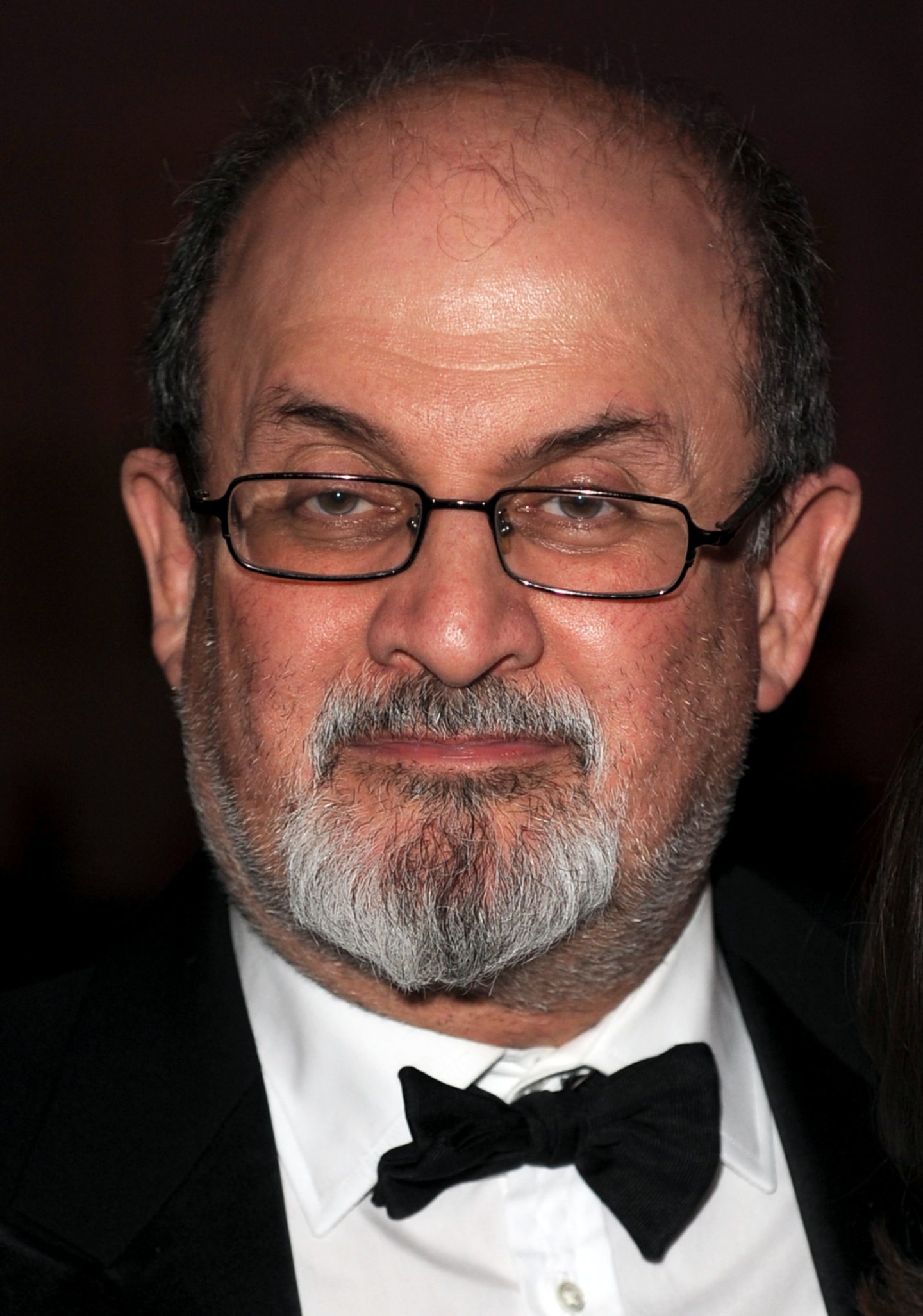
Satanic Verses author Sir Salman Rushdie remained on a ventilator last night as doctors fear he may lose an eye after he was stabbed up to 15 times on stage at a literary event in the US.
The India-born British author also suffered nerve damage to his arm and damage to his liver in the assault on Friday.
His attacker was wrestled to the ground by members of the audience waiting to hear Rushdie, 75, deliver a lecture on free speech.
The author had lived for many years in hiding after his 1988 novel, The Satanic Verses, was deemed blasphemous by Iran and prompted a fatwa calling for his murder issued by the late Supreme Leader Ayatollah Ruhollah Khomeini. However, Rushdie had in recent years made more public appearances with less security.
He was stabbed at least once in the neck and once in the abdomen, according to police, before he was airlifted to hospital. Hadi Matar, 24, has been charged with attempted murder but police say the motive is not yet known.
The author had said he felt his life was “relatively normal” in an interview conducted just two weeks before he was stabbed in New York State. Stern magazine had planned to publish its interview next week but brought it forward after the attack. The magazine described how Rushdie had arrived for the interview with no security at all, appearing relaxed as he said the Iranian fatwa was decades old.
The attack has drawn international condemnation, including from Prime Minister Boris Johnson, French President Emmanuel Macron and US President Joe Biden’s national security adviser.
Johnson said he was appalled, adding: “Sir Salman Rushdie has been stabbed while exercising a right we should never cease to defend. Right now my thoughts are with his loved ones. We are all hoping he is OK.”
Labour Party leader Sir Keir Starmer said: “Salman Rushdie has long embodied the struggle for liberty and freedom against those who seek to destroy them.
“This cowardly attack on him yesterday is an attack on those values. The whole Labour Party is praying for his full recovery.”
Macron tweeted: “For 33 years, Salman Rushdie has embodied freedom…His battle is ours, a universal one.”
US national security adviser Jake Sullivan said: “This act of violence is appalling. All of us in the Biden-Harris Administration are praying for his speedy recovery. We are thankful to good citizens and first responders for helping Mr Rushdie so quickly after the attack and to law enforcement for its swift and effective work, which is ongoing.”
Rushdie’s agent Andrew Wylie said he was on a ventilator and unable to speak, adding that his condition was not good and that he would likely lose an eye. Wylie added that nerves in Rushdie’s arm were severed in the attack and his liver was stabbed and damaged.
Major Eugene Staniszweski of New York State Police said the suspect jumped on to the stage and attacked Rushdie, stabbing him at least once in the neck and at least once in the abdomen.
“Several members of the staff at the institution and audience members rushed the suspect and took him to the ground, and shortly thereafter, a trooper who was at the institution took the suspect into custody with the assistance of a Chautauqua County Sheriff’s deputy,” he said. “Mr Rushdie was provided medical treatment by a doctor who was in the audience until EMS arrived on scene.”
Rushdie’s book The Satanic Verses has been banned in Iran since 1988, after being branded blasphemous by the authorities. Rushdie lived in hiding for many years in London under a British government protection programme until, in 1998, the Iranian government withdrew its support for the death sentence and the writer gradually returned to public life, even appearing as himself in the 2001 hit film Bridget Jones’s Diary. The Index on Censorship, an organisation promoting free expression, said money was raised to boost the reward for Sir Salman’s killing as recently as 2016, underscoring that the fatwa for his death still stood.
However, Iranian politician Malek Shariati Niasar has reportedly hinted the attack could have been the direct work of Iran as he branded Rushdie an apostate.
He said: “Attacking the renegade Salman Rushdie in America: 1. It should be Iran’s work directly: proving the power of Islamic Iran. 2. The work of a Muslim ‘Khomeini did not see’ and be independent from Iran: exporting the revolution to the heart of the enemy. 3. Let America and England do their own work (!): a lesson in trusting the West. But in all three cases it is a warning to the killers of Martyr Soleimani.”
Hardline Iranian newspapers have celebrated the attack on the author. “Satan on the path to hell,” the conservative newspaper Khorasan wrote above a picture of Rushdie on a stretcher.
“A thousand bravos…to the brave and dutiful person who attacked the apostate and evil Salman Rushdie in New York,” the hardline Kayhan newspaper, whose editor-in-chief is appointed by Iran’s Supreme Leader Ali Khamenei, wrote, adding: “The hand of the man who tore the neck of God’s enemy must be kissed.”
Newspaper Vatan-e Emrouz’s main story covered what it described as: “A knife in the neck of Salman Rushdie.”
The reformist newspaper Etemad’s headline asked: “Salman Rushdie in neighbourhood of death?”
But the 15th Khordad Foundation – which placed a £2.4 million bounty on Rushdie – remained quiet. Staff there declined to comment.
The foundation, whose name refers to the 1963 protests against Iran’s former shah by Khomeini’s supporters, typically focuses on providing aid to the disabled and others affected by war.
Rushdie began his writing career in the early 1970s with two unsuccessful books before Midnight’s Children, about the birth of India, which won the Booker Prize in 1981. His other books include The Golden House and Fury.
He was knighted in 2008 and earlier this year was made a member of the Order of the Companions of Honour as part of the Queen’s Birthday Honours.

Enjoy the convenience of having The Sunday Post delivered as a digital ePaper straight to your smartphone, tablet or computer.
Subscribe for only £5.49 a month and enjoy all the benefits of the printed paper as a digital replica.
Subscribe © PA
© PA